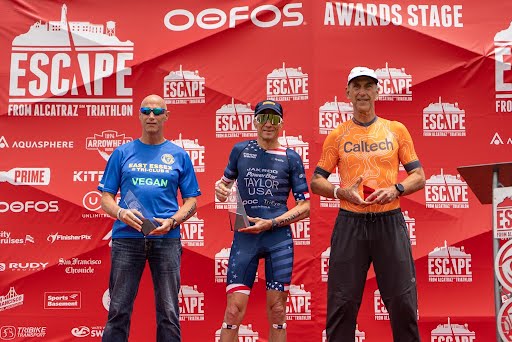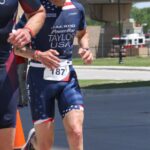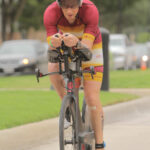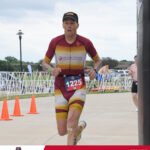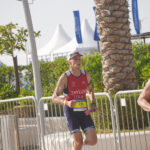Just a quick follow-up to my last post about my return to the Escape from Alcatraz triathlon after a 15-year absence. The race was definitely a challenge with, as I noted in my last article, all three legs of the race being difficult. Particularly tough was the swim which was about ten minutes longer than in recent years, had rough water in the Bay, I experienced calf and hamstring cramps, and sighting was really difficult.
being difficult. Particularly tough was the swim which was about ten minutes longer than in recent years, had rough water in the Bay, I experienced calf and hamstring cramps, and sighting was really difficult.
Before I dive in with details, many thanks to Dr. Kevin Stone and The Stone Clinic (a sponsor of Escape from Alcatraz and my sports medicine provider) for offering me an entry into the race. I’ve known Dr. Stone for more than 20 years (we wrote a book on sports-injury management some years ago) and The Stone Clinic has been instrumental in getting me back to health after my hit-and-run incident in 2021 and keeping me healthy since then.
I felt well prepared for the race, especially having swum in Aquatic Park (a semi-enclosed part of the Bay) four times, ridden the bike course seven times, and run the run course four times in the previous month.  My race morning went smoothly (though it started at 3:45am!), I set up my transition, warmed up physically, and boarded the bus, and then the ferry to go to the swim start just of Alcatraz Island.
My race morning went smoothly (though it started at 3:45am!), I set up my transition, warmed up physically, and boarded the bus, and then the ferry to go to the swim start just of Alcatraz Island.
I did a lot of mental imagery and had a good physical activation shortly before the swim started. I was relaxed and focused as I jumped into the water (I didn’t even notice the cold water). Despite the longer than expected swim due to the difficult water conditions, I stayed positive, and emerged from the Bay cold, but with good energy. I ran the ½ mile from the swim exit to the transition area, had a fast T1, and began the bike leg of the race.
emerged from the Bay cold, but with good energy. I ran the ½ mile from the swim exit to the transition area, had a fast T1, and began the bike leg of the race.
Having ridden the bike course so often, I felt confident in having chosen to ride my triathlon bike, instead of my road bike, even though I ride a 1x up front. The vast majority of competitors rode their road bikes, but the pros and the competitive age groupers mostly chose tri-bikes. I pushed hard throughout the bike and focused on fueling, hydration, and staying safe on the crowded course. Arriving at  T2, I had trouble getting my race shoes on because both my hands and feet were numb from the cold, but I wasn’t too concerned because a race of this length (just over three hours for me) is rarely decided in transitions (and it wasn’t for me).
T2, I had trouble getting my race shoes on because both my hands and feet were numb from the cold, but I wasn’t too concerned because a race of this length (just over three hours for me) is rarely decided in transitions (and it wasn’t for me).
My legs felt a bit tired as I began the run, but I found that I was able to maintain my stride start to finish, attacked the climbs, and, important to me, once again ran up the infamous Sand Ladder (a VERY steep, 360-step climb consisting of sand and steps made of wooden posts held in place by cables), something few age groupers do, but is a point of pride for me. The last two miles of the race were flat, so I just relaxed and steadily increased my pace and ended strong.
360-step climb consisting of sand and steps made of wooden posts held in place by cables), something few age groupers do, but is a point of pride for me. The last two miles of the race were flat, so I just relaxed and steadily increased my pace and ended strong.
I soon learned that I won my age group which was very gratifying given the prestige and competitiveness  of Escape from Alcatraz. My victory ups my 2023 race record to four wins in six races (I was 2nd in the other two). My exceptional training leading into the race (thanks to my coach, Dr. Greg Rhodes!), feeling rested and motivated on race day, a well-executed race plan, and the satisfying result, have all given me both confidence and momentum as I enter the last phase
of Escape from Alcatraz. My victory ups my 2023 race record to four wins in six races (I was 2nd in the other two). My exceptional training leading into the race (thanks to my coach, Dr. Greg Rhodes!), feeling rested and motivated on race day, a well-executed race plan, and the satisfying result, have all given me both confidence and momentum as I enter the last phase of my current training block before I leave for the World Sprint Triathlon Championships in Germany in mid-July.
of my current training block before I leave for the World Sprint Triathlon Championships in Germany in mid-July.
The keys to my successful Escape from Alcatraz included:
- A nice balance of volume and intensity heading into Alcatraz,
- A short, but good, taper,
- Being very familiar with the courses,
- Doing mental imagery of the race I wanted to have every day in the week before the race,

- Being really organized the day before and morning of the race,
- Having a good physical warm-up on race morning,
- Staying positive on the swim,
- Pushing hard up the bike climbs,
- Running up all the climbs on the run, and
- Finding another gear on the run descents and flats.
Getting the opportunity to enter Escape from Alcatraz (due to a sponsor entry) only a month before the ![]() race, changing up my training program to accommodate the unique course, and having a successful Alcatraz, in terms of both execution and outcome have been really valuable to my “A” race preparations. It showed me that I could climb on my bike (I’ve never thought of myself as a climber). I believe that all of the vertical I’ve done in the last month has added additional power that I can use for my upcoming races that are shorter. It also makes me feel like the transition to Olympic-distance races after Germany, which will dominate my late-season race schedule, will be much easier than usual because this race was much longer and harder than any Olympic-distance race. Overall, Escape from Alcatraz was a great experience that I hope to repeat in future years.
race, changing up my training program to accommodate the unique course, and having a successful Alcatraz, in terms of both execution and outcome have been really valuable to my “A” race preparations. It showed me that I could climb on my bike (I’ve never thought of myself as a climber). I believe that all of the vertical I’ve done in the last month has added additional power that I can use for my upcoming races that are shorter. It also makes me feel like the transition to Olympic-distance races after Germany, which will dominate my late-season race schedule, will be much easier than usual because this race was much longer and harder than any Olympic-distance race. Overall, Escape from Alcatraz was a great experience that I hope to repeat in future years.

